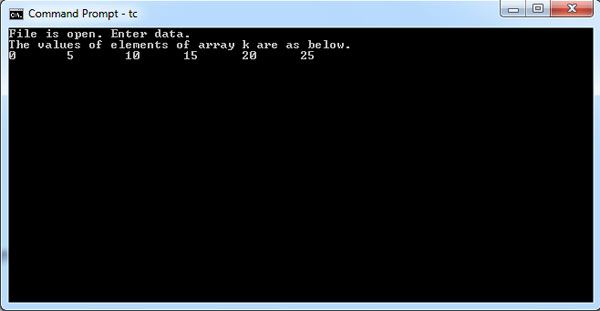Function putw()
This function writes an integer (whole number) into a file. The prototype of the function is as shown below.
putw (Number, FILE* Stream);
The first argument is the number to be written and the second is the file pointer. The header file <stdio. h> should be included in the program. The following is an illustration of the code:
int n = 100;
FILE* Fptr;
putw( n, Fptr );
The function writes one value at a time. For a number of values to be written, the function may be called again with the help of a loop.
Function getw ()
This function reads an integer data from the file. The function may be called in the following manner:
FILE* Fptr;
getw (Fptr);
If a number of values are to be obtained we may use a loop to call the function several times.
Illustrates the application of functions putw () and getw ().
#include <stdio.h> #include <stdlib.h> // for exit function void main() { FILE* Fptr; int i, j, k[6]; Fptr = fopen("file1","w"); clrscr(); if(Fptr ==NULL) { printf("File could not be opened."); exit (1); } else fprintf(stdout, "File is open. Enter data.\n"); for(i =0; i <6; i++) putw(k[i] = 5*i, Fptr ); fclose(Fptr); Fptr = fopen ("file1","r"); printf("The values of elements of array k are as below.\n"); for (j =0; j<6; j++) printf("%d\t", getw(Fptr)); printf ("\n"); fclose(Fptr); }

 Dinesh Thakur holds an B.C.A, MCDBA, MCSD certifications. Dinesh authors the hugely popular
Dinesh Thakur holds an B.C.A, MCDBA, MCSD certifications. Dinesh authors the hugely popular